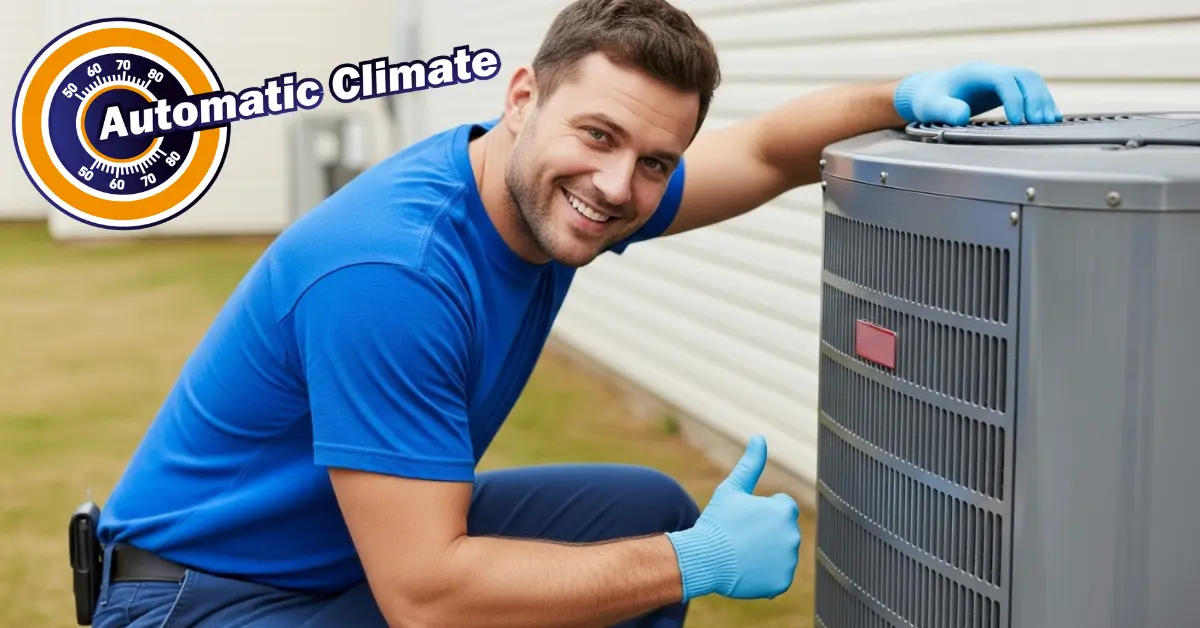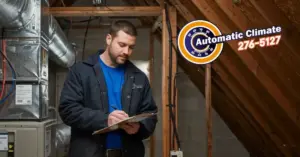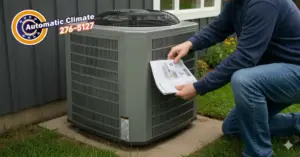More Than Just Cool Air: How to Combat Richmond’s Humidity for a Healthier Home
Written by Cole Summers at Automatic Climate in Richmond, Virginia.
Let’s be honest, living in Richmond means you know humidity. It’s that thick, soupy air that greets you the second you step outside in July. But did you know that feeling of stickiness is more than just uncomfortable? It’s a sign of a bigger battle happening inside your home. Effectively controlling indoor humidity is one of the most crucial things you can do for your property and your family’s health. It’s not just about feeling cool; it’s about creating a safe, healthy living space. For many homeowners, the key to winning this fight is understanding how to combat Richmond’s humidity, and that often starts with your HVAC system.
We’ve all been there. You crank the AC, but you still feel kinda clammy. That’s because standard air conditioning isn’t always enough to properly combat Richmond’s humidity. High humidity in your house can lead to a whole host of problems you might not even be aware of. We’re talking about everything from mold growth, which can trigger allergies and asthma, to actual structural damage to your home’s wood floors and furniture. It’s a silent threat that can have some pretty loud consequences if you ignore it. As the old saying goes, “An ounce of prevention is worth a pound of cure,” and that couldn’t be more true when it comes to moisture control.
Why Is Humidity Such a Big Deal in Richmond?

Richmond’s geography, nestled by the James River, gives us our beautiful scenery but also blesses us with a subtropical climate. That means hot, muggy summers are just part of the package. When that outdoor moisture seeps into our homes, it creates the perfect breeding ground for trouble. Think about it: mold, mildew, dust mites—they all thrive in damp environments. These allergens can seriously impact your indoor air quality, leading to respiratory issues, skin irritation, and just general discomfort. Learning to combat Richmond’s humidity isn’t a luxury; it’s a necessity for healthy living in the RVA.
Beyond the health stuff, excess moisture can literally eat away at your home. Wood warps, paint peels, and you might even notice a musty smell that you just can’t seem to get rid of. This is your house telling you it has a humidity problem. Ignoring these signs can lead to expensive repairs down the line. Your home is your biggest investment, and protecting it from moisture damage is key. Properly managing indoor moisture levels is a core part of home maintenance, something that many people overlook until it’s too late. The challenge to combat Richmond’s humidity is ongoing, but with the right tools and knowledge, it’s a winnable one.
Our Trusted Partners
EXCELLENTTrustindex verifies that the original source of the review is Google. Aaron J. Visited our home later this evening to follow up with today’s install and the system checked out as it should. The only issue we had was connecting and setting up the wireless thermostat due to the app issues. He was very professional and patient. John and Joe replaced our 2nd floor gas heating system in a professional manner. Everything went smooth according to them and they finished the job in less time than expected. Aaron was professional and extremely thorough during his visit to our home. He took the time to explain the workings of our HVAC system and answered every question. To add to the above, I called the office and spoke with both Austin and Jason who were also very helpful while explaining the warranty and transfer of same. We are extremely pleased with Automatic Climate and will highly recommend to anyone who may ask for recommendations.
Owner's reply
Thank you for sharing your positive experience! We're thrilled Aaron, Austin, and Jason could assist you so thoroughly. Your recommendation means a lot, and we're glad we could help with your HVAC system and warranty details.Posted onTrustindex verifies that the original source of the review is Google. I had a very positive experience with them. They had better financing options, better prices, and were more responsive than other companies I got quotes from. Michael Chris and the whole team were fantastic. Highly recommendPosted onTrustindex verifies that the original source of the review is Google. Technician was on time, personable and professional. He throughly explained everything that he was going to do and identified any concerns. Very pleased with the overall experience and would recommend to other homeownersPosted onTrustindex verifies that the original source of the review is Google. I had the coils cleaned in my tankless water heater. Aaron Jernigan was so seemingly competent, so well-mannered, so good explaining what was going on, I am considering switching to Automatic Climate, I will definitely have all the vents in my house blown out in the near future.Posted onTrustindex verifies that the original source of the review is Google. Fast, friendly, knowledgeable and professional. Their associate, Casey J, helped fix our heat when we were enduring 20-30 degree nights. Thank you so much!!Posted onTrustindex verifies that the original source of the review is Google. Charlie was very dedicated. Provided excellent service. Very impressed with his dedication. Did check on HVAC and cleaned drier vent in Condo we purchased last summer.Posted onTrustindex verifies that the original source of the review is Google. I've been a customer of Automatic Climate for several years. I value the services of this firm. My commitment to renewing my maintenance contract year after year is directly related to the technical expertise of one of the company’s many representatives, Antonio Diaz. Antonio has kept all three of my units running smoothly for years, and when necessary forewarns me early of any pending issues. He offers solutions right away without long waits for follow up. I've never had to call the company back to correct any of his work. Antonio attributes his success and extraordinary customer service to the culture of Automatic Climate. I would recommend Antonio and Automatic Climate to any of my friends and neighbors. They're a company you can trust.
Owner's reply
Thank you so much for your kind words! We're thrilled to hear you had a positive experience with our service.Posted onTrustindex verifies that the original source of the review is Google. John & Nick were here today to clean our air ducts. They were very thorough and made sure that they left our home as clean as when they arrived. They explained the process clearly and worked efficiently. Great job!Verified by TrustindexTrustindex verified badge is the Universal Symbol of Trust. Only the greatest companies can get the verified badge who has a review score above 4.5, based on customer reviews over the past 12 months. Read more
The Connection Between Your HVAC and a Healthy Home

Your HVAC system is your number one soldier in the war against moisture. While its main job is to heat and cool the air, a huge part of the cooling process is dehumidification. As your air conditioner runs, it pulls warm, moist air over cold evaporator coils. This causes the water vapor to condense, and it’s collected and drained away. But here’s the catch: if your AC unit is too big for your space, it will cool the house down too quickly and shut off before it has a chance to remove enough moisture. This is a super common mistake, and it leaves you with a cold but clammy house. This is why professional sizing and installation from a company like Automatic Climate is so important to effectively combat Richmond’s humidity.
On the flip side, an old or poorly maintained unit will also struggle. If the coils are dirty or the refrigerant is low, it just can’t perform efficiently. Regular HVAC maintenance isn’t just about preventing breakdowns; it’s about ensuring your system can do its full job, including dehumidifying. When you combat Richmond’s humidity, you’re not just making your home more comfortable; you’re making it healthier and protecting your investment. It’s a total win-win. Many homeowners dont realize the deep connection between their HVAC’s performance and the overall health of their indoor environment. It’s time we started paying more attention.
The quest to combat Richmond’s humidity is a year-round job. Even in cooler months, activities like cooking and showering can raise indoor humidity levels. A properly functioning HVAC system helps manage this, but sometimes you need a little extra help. That’s where solutions like whole-home dehumidifiers come in. These systems integrate directly with your existing ductwork to give you precise control over your home’s moisture levels, independent of the air conditioner. It’s the ultimate tool to combat Richmond’s humidity and ensure your home is always in that ideal range—typically between 30% and 50% humidity. Investing in your indoor air is investing in your family’s well-being. As Maya Angelou said, “When you know better, you do better.” Knowing how humidity affects your home is the first step to doing better.
The Unseen Effects of High Humidity
Health Issues
Promotes growth of mold, mildew, and dust mites, triggering allergies and asthma.
Home Damage
Can warp wooden floors and furniture, cause paint to peel, and damage electronics.
Reduced Comfort
Makes the air feel warmer than it is, leading to a clammy, uncomfortable feeling.
Higher Energy Bills
Your AC works harder and less efficiently to cool moist air, increasing energy use.
Sources: EPA, Consumer Reports
Your Arsenal: Tools to Combat Richmond’s Humidity

So, we know high humidity is bad. What can we actually do about it? Fortunately, you have several options. The first and most obvious is a properly maintained air conditioner. As we discussed, this is your frontline defense. But when you need to bring in reinforcements, a dehumidifier is your best bet. You can get portable units for specific problem areas like a damp basement, or you can go for the gold standard: a whole-home dehumidifier.
A whole-home dehumidifier integrates with your HVAC system to treat the air in your entire house. It provides consistent, powerful moisture removal that you can set and forget. This is the most effective way to combat Richmond’s humidity on a large scale. It ensures every room in your home stays within that ideal 30-50% humidity range, protecting your health and your property. It’s a significant upgrade, but one that pays for itself in comfort, health, and preventing costly repairs. Think of it as an insurance policy against moisture damage. It’s a proactive step to combat Richmond’s humidity rather than reacting to the problems it causes.
SKip The Line! Schedule Your HVAC Service by Booking Online Now.
Get in Touch
Contact Us
Simple Lifestyle Changes That Make a Big Difference
Technology is great, but there are also some low-tech, everyday habits you can adopt to help combat Richmond’s humidity. One of the biggest culprits of indoor moisture is us! Cooking, showering, and even breathing adds water vapor to the air. Always use your kitchen and bathroom exhaust fans. Make sure they’re vented to the outside, not just into the attic. Running these fans for 20-30 minutes after you’re done can pull a significant amount of moisture out of your home.
Other simple tips include taking shorter, cooler showers, covering pots and pans when you cook, and checking for leaks around your home. A small leak under a sink or in the roof can introduce a surprising amount of moisture over time. Also, be mindful of your houseplants. While they’re beautiful, they release moisture into the air through transpiration. Grouping them in one area can help, but if you have a serious humidity problem, you might need to scale back your indoor jungle. Every little bit helps when you’re trying to combat Richmond’s humidity. These small adjustments, combined with the right equipment, create a powerful strategy for a drier, healthier home.
Ultimately, the goal is to create a balanced indoor ecosystem. It’s not about eliminating humidity entirely—some moisture is necessary for comfort and health. It’s about control. By taking a multi-faceted approach, you can effectively combat Richmond’s humidity and turn your home into a true sanctuary. It requires a bit of knowledge and the right team on your side. A professional consultation can help you identify your specific needs and find the best solution for your home and budget. Don’t just put up with that sticky feeling; take control and breathe easier.
HVAC Maintenance Checklist for Humidity Control
Change Filters Regularly
Clogged filters restrict airflow, making your system work harder and reducing its ability to dehumidify. Check them monthly.
Keep Coils Clean
Dirty evaporator and condenser coils can’t transfer heat effectively, impairing the dehumidification process. This is a job for a pro.
Check the Condensate Drain
Ensure the drain line is clear of clogs so the moisture your AC removes can actually drain away from your home.
Schedule Annual Tune-Ups
A professional can check refrigerant levels, test components, and ensure your system is optimized to combat Richmond’s humidity.
Sources: HGTV, Automatic Climate Maintenance
The Long-Term Vision: Investing in Your Home’s Air

Viewing your efforts to combat Richmond’s humidity as an investment rather than an expense is a game-changer. When you install a whole-home dehumidifier or upgrade to a high-efficiency HVAC system, you’re not just buying a piece of equipment. You’re investing in lower energy bills, because your AC won’t have to work as hard. You’re investing in your family’s health by reducing allergens. And you’re investing in your property value by preventing moisture-related damage. It’s one of the smartest upgrades a homeowner in our climate can make.
The science is clear. The American Society of Heating, Refrigerating and Air-Conditioning Engineers (ASHRAE) recommends maintaining indoor humidity below 60% to prevent mold growth. Consistently keeping your home in the optimal 30-50% range is the gold standard. Achieving this level of control is difficult with just an air conditioner, which is why dedicated dehumidification is so important. When you decide to seriously combat Richmond’s humidity, you’re aligning your home with the recommendations of industry experts for a healthier living environment.
Thomas Edison once said, “There’s a way to do it better – find it.” For homeowners in our area, finding a better way to live comfortably means tackling humidity head-on. The technology exists. The expertise is available. It’s about making the decision to prioritize your indoor environment. Don’t let that soupy, summer air dictate your comfort and health. Take control, and find the better way to combat Richmond’s humidity. Your family, and your home, will thank you for it. The peace of mind that comes from knowing you’re providing the healthiest possible environment is truly priceless.
Ready to Breathe Easier?
Stop putting up with that sticky, uncomfortable feeling. Take the first step to effectively combat Richmond’s humidity and create a healthier home environment. The experts at Automatic Climate are here to help.
Or call us at (804) 803-1983
Case Study: The Miller Family
Problem: The Millers in Midlothian noticed a persistent musty smell in their home and their son’s allergies were acting up constantly. Their AC kept the house cool, but it always felt damp.
Solution: After a consultation, we discovered humidity levels were consistently over 65%. We installed a whole-home dehumidifier integrated with their existing HVAC system.
Result: Within a week, the musty smell was gone. Their indoor humidity stabilized at 45%. Their son’s allergy symptoms improved dramatically, and they reported feeling more comfortable at a higher thermostat setting, saving on energy costs. They successfully learned how to combat Richmond’s humidity.
Source: Customer Testimonials
Beyond the Dehumidifier: A Holistic Approach

While mechanical solutions are powerful, a truly effective strategy to combat Richmond’s humidity involves looking at your home as a complete system. This includes your home’s “envelope”—its walls, windows, roof, and foundation. Air leaks are a major source of humidity infiltration. Hot, moist summer air can find its way in through gaps around windows, doors, and utility penetrations. A home energy audit can help identify these problem spots. Sealing these leaks with caulk, weatherstripping, and spray foam is a cost-effective way to reduce the load on your HVAC and dehumidifier.
Proper insulation is another key factor. Insulation doesn’t just keep your home warm in the winter; it helps keep it cool and dry in the summer. If your attic insulation is inadequate, the summer sun can heat up your attic space, creating a pressure difference that pulls humid air from outside into your living space. Ensuring your home is well-insulated helps to stabilize your indoor environment and gives you a major advantage as you combat Richmond’s humidity. These foundational improvements work hand-in-hand with your mechanical systems for maximum effect.
Finally, consider your landscaping. Large trees that shade your home can significantly reduce solar gain, keeping your house cooler and reducing AC run time. However, be sure that bushes and other plants are trimmed back from your home’s foundation and your outdoor AC unit. This promotes airflow and helps the area around your foundation dry out, reducing moisture that could seep into your crawlspace or basement. A holistic approach that considers every aspect of your property is the most sustainable way to combat Richmond’s humidity for the long haul.
Frequently Asked Questions
1. What is the ideal indoor humidity level?
For both health and comfort, the ideal indoor humidity level is between 30% and 50%. This range is key to effectively combat Richmond’s humidity.
2. Can I just use my air conditioner to dehumidify?
An AC does dehumidify as part of its cooling cycle, but it often isn’t enough, especially during milder, damp days. A dedicated dehumidifier gives you control regardless of the temperature.
3. Are whole-home dehumidifiers noisy?
Modern whole-home dehumidifiers are designed to be very quiet. Since they are installed with your HVAC system, typically in a basement, crawlspace, or closet, you likely won’t hear them at all.
4. How do I know if my home has a humidity problem?
Signs include condensation on windows, a musty smell, peeling paint, warped wood, or a persistent clammy feeling in the air. A hygrometer can give you an exact reading.
5. Will a dehumidifier increase my energy bill?
While a dehumidifier uses energy, it allows you to feel more comfortable at a higher thermostat setting. This often leads to overall energy savings on your cooling costs.
6. What’s the difference between a portable and a whole-home dehumidifier?
A portable unit treats a single room and requires you to empty a water basin. A whole-home unit integrates with your ductwork to treat the entire house automatically.
7. Can high humidity damage my electronics?
Yes. Moisture can cause corrosion and short circuits in sensitive electronic devices. Controlling humidity helps protect them.
8. Do I need a dehumidifier in the winter?
Usually, winter air is drier. However, modern, tightly sealed homes can sometimes trap moisture from daily activities, so it’s possible. Monitoring your levels is key.
9. How does humidity affect sleep?
High humidity can disrupt sleep by making it harder for your body to cool itself through sweat evaporation, leading to a restless night.
10. Is it hard to maintain a whole-home dehumidifier?
Maintenance is minimal. It typically involves cleaning or replacing the air filter once a year, which can be done during your regular HVAC tune-up.
11. Can I install a whole-home dehumidifier myself?
This is a job for a professional. It requires integration with your existing ductwork and electrical system to ensure it works correctly and safely.
12. How does a dehumidifier help with allergies?
By keeping humidity below 50%, it inhibits the growth of common allergens like mold, mildew, and dust mites, improving your indoor air quality.
13. Will my plants be okay with a dehumidifier?
Most common houseplants will be perfectly fine in the 40-50% humidity range. Tropical plants that require very high humidity might need occasional misting.
14. Does a dehumidifier help with musty odors?
Absolutely. Musty odors are often caused by mold and mildew, which thrive in damp conditions. Controlling the moisture eliminates the source of the smell.
15. What is a hygrometer?
A hygrometer is an inexpensive device that measures the amount of water vapor in the air (humidity). It’s a great tool to monitor your home’s levels.
16. Can humidity cause my energy bills to go up?
Yes. Humid air feels warmer, so you’re likely to set your thermostat lower. Your AC also works less efficiently when trying to cool very moist air.
17. Are there any downsides to a whole-home dehumidifier?
The primary downside is the upfront installation cost. However, this is often offset by long-term savings and benefits to your health and home.
18. How long does it take to notice a difference?
After installing a whole-home dehumidifier, most homeowners notice a significant improvement in comfort and air quality within 24-48 hours.
19. Will a dehumidifier help get rid of pests?
Some pests like cockroaches, silverfish, and spiders are attracted to moist environments. Reducing humidity can make your home less inviting to them.
20. Why should I choose Automatic Climate to help combat Richmond’s humidity?
With experience serving the Richmond area since 1983, we understand the unique challenges of our climate. We provide expert advice, professional installation, and a commitment to customer satisfaction.
Sources: This Old House, About Automatic Climate
Relevant External Resources:
This article was drafted with the assistance of a Large Language Model, specifically Gemini, which was used for initial drafting and article outlining. The content was subsequently reviewed, edited, and fact-checked by a human writer to ensure accuracy, clarity, and adherence to editorial standards. While AI assists in the creation of this content, the human author(s) retain editorial control and full responsibility for the final content, including its accuracy and integrity. Readers should be aware that AI-generated content may present limitations, and the information provided should be considered with this in mind. The information provided in this article is for general informational purposes only. While we strive to keep the information up-to-date and correct, we make no representations or warranties of any kind, express or implied, about the completeness, accuracy, reliability, suitability, or availability with respect to the 1 article or the information, products, services, or related graphics contained in the article for any purpose. Any reliance you place on such information is therefore strictly at your own risk. 2 HVAC systems involve electrical components, refrigerant, and potentially natural gas; attempting repairs without proper training and safety precautions can result in injury, property damage, or voiding warranties. Always consult with a qualified and licensed HVAC professional, like those at Automatic Climate (https://www.automaticclimate.com/, (804) 803-1983), for diagnosis and repair of HVAC issues.
Our Trusted Partners
EXCELLENTTrustindex verifies that the original source of the review is Google. Aaron J. Visited our home later this evening to follow up with today’s install and the system checked out as it should. The only issue we had was connecting and setting up the wireless thermostat due to the app issues. He was very professional and patient. John and Joe replaced our 2nd floor gas heating system in a professional manner. Everything went smooth according to them and they finished the job in less time than expected. Aaron was professional and extremely thorough during his visit to our home. He took the time to explain the workings of our HVAC system and answered every question. To add to the above, I called the office and spoke with both Austin and Jason who were also very helpful while explaining the warranty and transfer of same. We are extremely pleased with Automatic Climate and will highly recommend to anyone who may ask for recommendations.
Owner's reply
Thank you for sharing your positive experience! We're thrilled Aaron, Austin, and Jason could assist you so thoroughly. Your recommendation means a lot, and we're glad we could help with your HVAC system and warranty details.Posted onTrustindex verifies that the original source of the review is Google. I had a very positive experience with them. They had better financing options, better prices, and were more responsive than other companies I got quotes from. Michael Chris and the whole team were fantastic. Highly recommendPosted onTrustindex verifies that the original source of the review is Google. Technician was on time, personable and professional. He throughly explained everything that he was going to do and identified any concerns. Very pleased with the overall experience and would recommend to other homeownersPosted onTrustindex verifies that the original source of the review is Google. I had the coils cleaned in my tankless water heater. Aaron Jernigan was so seemingly competent, so well-mannered, so good explaining what was going on, I am considering switching to Automatic Climate, I will definitely have all the vents in my house blown out in the near future.Posted onTrustindex verifies that the original source of the review is Google. Fast, friendly, knowledgeable and professional. Their associate, Casey J, helped fix our heat when we were enduring 20-30 degree nights. Thank you so much!!Posted onTrustindex verifies that the original source of the review is Google. Charlie was very dedicated. Provided excellent service. Very impressed with his dedication. Did check on HVAC and cleaned drier vent in Condo we purchased last summer.Posted onTrustindex verifies that the original source of the review is Google. I've been a customer of Automatic Climate for several years. I value the services of this firm. My commitment to renewing my maintenance contract year after year is directly related to the technical expertise of one of the company’s many representatives, Antonio Diaz. Antonio has kept all three of my units running smoothly for years, and when necessary forewarns me early of any pending issues. He offers solutions right away without long waits for follow up. I've never had to call the company back to correct any of his work. Antonio attributes his success and extraordinary customer service to the culture of Automatic Climate. I would recommend Antonio and Automatic Climate to any of my friends and neighbors. They're a company you can trust.
Owner's reply
Thank you so much for your kind words! We're thrilled to hear you had a positive experience with our service.Posted onTrustindex verifies that the original source of the review is Google. John & Nick were here today to clean our air ducts. They were very thorough and made sure that they left our home as clean as when they arrived. They explained the process clearly and worked efficiently. Great job!Verified by TrustindexTrustindex verified badge is the Universal Symbol of Trust. Only the greatest companies can get the verified badge who has a review score above 4.5, based on customer reviews over the past 12 months. Read more











